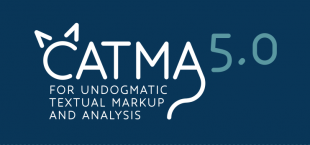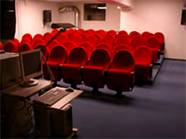E-Research
In cooperation with the Regional Computer Center and the Informatics we will offer services for high performance computing (HPC) and the virtualization of scientific data.
E-Research also includes the provision of suitable software and infrastructure for databases and the establishment of web-based offers and also the digitization of materials for research (especially 3D).
Hub of Computing and Data Science
The Hub of Computing and Data Science (HCDS) is a central institution of the Universität Hamburg for implementing the digitisation strategy in research. In the Science City Bahrenfeld and at various other locations in Hamburg, it provides a low-threshold introduction to the use and research of digital methods in the Method Competence Center, in which the RDM Center also takes part. In addition, it offers various disciplines and projects in the Cross-Disciplinary Labs a forum for the exchange of information and cooperation at the interface between the methodological sciences and the applied sciences.
Heurist - Database
Heurist - a database service for your research data
We provide you with a database service for your research data management - Heurist. It is a collaborative open source web database system for recording, managing, analyzing, visualizing, publishing and archiving heterogeneous and complex linked research data.
It saves you as a researcher the hassle of operating your own dedicated server and database for your projects, programming, creating linked websites or performing maintenance. In contrast to conventional database systems, the structure of the Heurist can be continuously adapted to new requirements of research results as well as those of researchers without having to laboriously restructure existing data. You can easily operate the entire system via a web interface.
The system can be reached at https://heurist.fdm.uni-hamburg.de/.
Repositories
Easy-DB image database (commercial)

A license for the "digital slide library" easydb was acquired at the Department of Art History, which can and is already used by other members of the Department and the Faculty.
Laboratories
CATMA

CATMA (Computer Assisted Textual Markup and Analysis) is a practical and intuitive tool for text researchers. In CATMA users can combine the hermeneutic, ‘undogmatic’ and the digital, taxonomy based approach to text and corpora – as a single researcher, or in real-time collaboration with other team members.
CATMA’s key features are:
- Support of digital text in almost any language, incl. right-to-left scripts (e.g. Arabic, Hebrew, Japanese)
- Full integration of annotation and analysis functions in a web browser
- Web-based collaboration for easy exchange of documents, annotations, and Tag Libraries
- Freely definable or pre-defined tags that can also be shared
- Interactive natural-language searches across text, corpora, and annotations
- Automated statistical and non-statistical analytical functions
- Built-in visualization of search results and analyses
- Analysis of complex text corpora in a single step
- Context-sensitive help function, tutorials, user manual, and help desk
Artefact Profiling Laboratories
 The study of written artefacts requires technical equipment that suits the objects’ characteristics and needs, their location, and the kind of research question and analysis intended. A threefold laboratory system supports the Centre’s study of written artefacts both in Hamburg and abroad, in museums and archives, and in the field.
The study of written artefacts requires technical equipment that suits the objects’ characteristics and needs, their location, and the kind of research question and analysis intended. A threefold laboratory system supports the Centre’s study of written artefacts both in Hamburg and abroad, in museums and archives, and in the field.
Its first component is a portable Mobile Lab for worldwide non-invasive analyses of written artefacts. The Mobile Lab operates frequently across Europe and beyond, featuring, amongst other equipment, XRF-spectrometers, a multispectral imaging system and FTIR spectroscopy. Secondly, the Cluster uses the highly effective stationary High Performance Labs at Universität Hamburg, the TUHH and at DESY. These, too, fulfil the highest technological standards and are continually updated, with for example, a dust-free cleanroom that is dedicated exclusively to the analysis of ancient DNA and a laser-coupled HR-ICP-MS as the most recent addition. Eventually, a modular Container Lab will fill the gap between high performance and in situ analysis using portable equipment. Currently under construction, it is designed to be transported to sites, museums and archives around the world and will be equipped with specific problem-oriented lab cells and with the required materials for both non-invasive and micro-invasive material analyses.
Media center of the Department of Language, Literature and Media
 The media center of the departments Language, Literature, Media I + II looks after the media rooms (seminar room, practice room/cinema, viewing and editing rooms, sound studio) and the media archive (video, audio, PC/Internet). Further services include the administration of materials for courses with media science content (radio/audio, film, television, PC and Internet), advice on the use of media in teaching and research, the rental of AV equipment for teaching and research purposes and the support of smaller production projects.
The media center of the departments Language, Literature, Media I + II looks after the media rooms (seminar room, practice room/cinema, viewing and editing rooms, sound studio) and the media archive (video, audio, PC/Internet). Further services include the administration of materials for courses with media science content (radio/audio, film, television, PC and Internet), advice on the use of media in teaching and research, the rental of AV equipment for teaching and research purposes and the support of smaller production projects.
Corpus laboratory of the HZSK
[The corpus laboratory of the HZSK is currently not in operation and is expected to offer services again from the summer semester!]
At the corpus laboratory of the Hamburg Center for Language Corpora, preconfigured computer workstations are available, on which the relevant tools and platforms are installed, especially for corpus work.
Students and members of the UHH can get advice and practical help for the entire corpus linguistic research process (from the survey to the evaluation). Recording devices, a digitization station for analog recordings and specialist literature are also available.
3-D Laboratory at the Data Center
3D-LAB at the Data Center
In post-processing we use the obtained 3D surface data to generate true-to-scale 3D models with realistic textures. Together with your metadata, we can make it available online for your virtual collection or the Research Data Repository of the Universität Hamburg.

